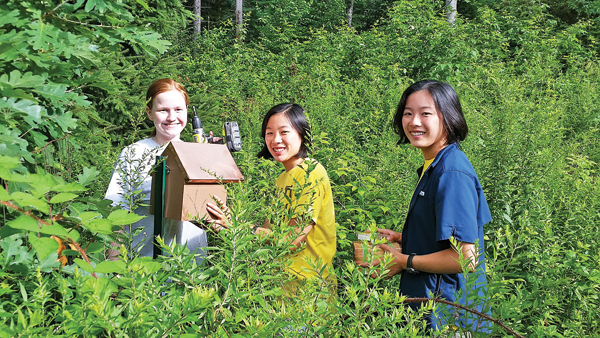

Catherine and Mary Tighe (center and right) helped Elizabeth Klosky mount her bee houses in Black Rock Forest.
When it comes to bees, Elizabeth Klosky can be very persuasive.
A year ago the Cornwall high school student convinced Assemblyman James Skoufis to don a white protective suit so he could get a close look at the family hives.
Elizabeth had an ulterior motive. She was hoping New York would adopt a program that has flourished in Virginia, where the state has subsidized new beekeepers.
The bee population has declined in recent years, and Elizabeth is trying to reverse the trend. It’s her gold project for Girl Scouts, and it’s also something she wants to accomplish.
The soon-to-be 12th-grader applied for three grants to continue her work. She wrote to one organization that had been providing money for kids doing environmental projects. Her letter arrived too late. The youth funding was depleted, but she wasn’t turned down.
Her potential benefactors were so impressed with Elizabeth’s proposal that they asked her to compete in the adult bracket, and they eventually subsidized her work.
On Aug. 2, Elizabeth led a contingent into Black Rock Forest, as she embedded bee houses in the woods to help native bees survive the winter. The houses, with tiny compartments, had been used to nurture past generations.
The lingering smell would attract new bees, and give them a place to stay until the arrival of spring. Forest Manager John Brady helped Elizabeth select the sites.
They placed two in the ground near the upper reservoir, a popular haunt for bees, because the fields are filled with flowers. Elizabeth and her team were careful to pick locations that would get lots of sunlight.Then they drove two miles into the forest, and placed two more domiciles near the Stone House, where there was once an apple orchard. Assemblyman Skoufis tagged along, and helped Elizabeth drive a stake into the ground to mount another one of her bee homes.
The work is important because millions of bees have been lost through colony collapse disorder — a phenomenon that has yet to be explained. “Ask 10 people why it happens,” Elizabeth’s father (Led Klosky) says, “and you’ll get 10 different answers.”
Although Mr. Skoufis couldn’t provide subsidies for new bee keepers, the Assembly did allocate $500,000 for a pollinator protection plan. “I wholeheartedly credit Elizabeth,” Mr. Skoufis said, “with raising local awareness of the importance of pollinators to our ecosystem. My understanding of the issue played a big part in my decision to support this funding.”
